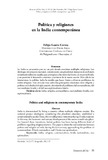Política y religiones en la India contemporánea

Voir/
Date
2017-07Auteur
Palabras Clave
India, Religión, Comunalismo, Nacionalismo hindú, NeoespiritualismoIndia, Religion, Communalism, Hindu nationalism, Neo
Metadatos
Afficher la notice complèteRésumé
La India se caracteriza por ser un país donde coexisten múltiples religiones. Los
ideólogos del proyecto nacional, considerando esta pluralidad, instauraron un Estado
constitucionalmente secular, que protegiera a las minorías frente a la mayoría hindú,
y así permitir el desarrollo armónico y unitario de la nueva nación. Más allá de las
intenciones, la política india ha tenido que hacer frente a diversos problemas de
orden religioso. Este artículo trata sobre las principales relaciones entre religión y
política en la India del siglo pasado, abordando el problema del comunalismo, del
nacionalismo hindú y el del neo-espiritualismo hindú.
Colecciones
Información Adicional
| Otros Títulos | Politics and religions in contemporary India |
| Correo Electrónico | filc78@gmail.com / fl uarte@uc.cl |
| ISSN | 1856-6812 |
| ISSN Electrónico | 2244-8810 |
| Resumen en otro Idioma | India is characterized by being a country where multiple religions coexist. Th e national project ideologists, considering this pluralistic situation, established a constitutionally secular State, who would protect minorities facing Hindu majority. In this way, the harmonic and unitary development of the nation would take place. Far beyond these intentions, Indian politics has been facing diff erent kind of problems regarding religious matters. Th is paper is about the main relations between politics and religion in India during the last century, approaching the problem of communalism, Hindu nationalism and Hindu neo spiritualism. |
| Colación | 33-50 |
| Periodicidad | Semestral |
| País | Venezuela |
| Publicación Electrónica | Revista Humania del Sur |
| Sección | Revista Humania del Sur: |





